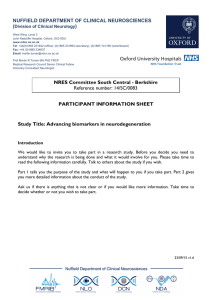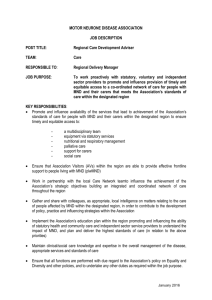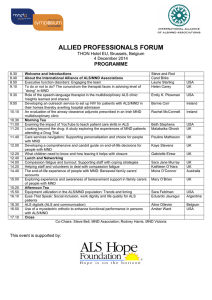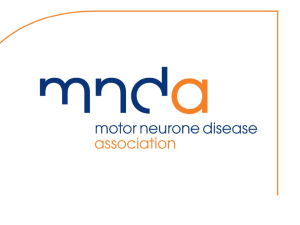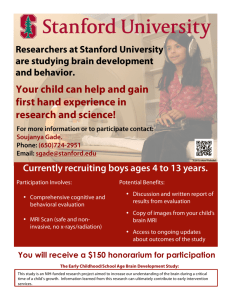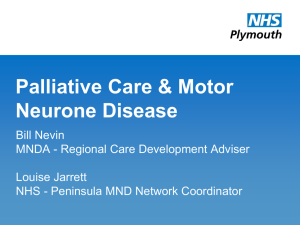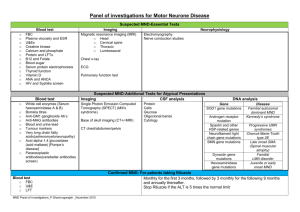NUFFIELD DEPARTMENT OF CLINICAL NEUROSCIENCES ( ) Division of Clinical Neurology
advertisement
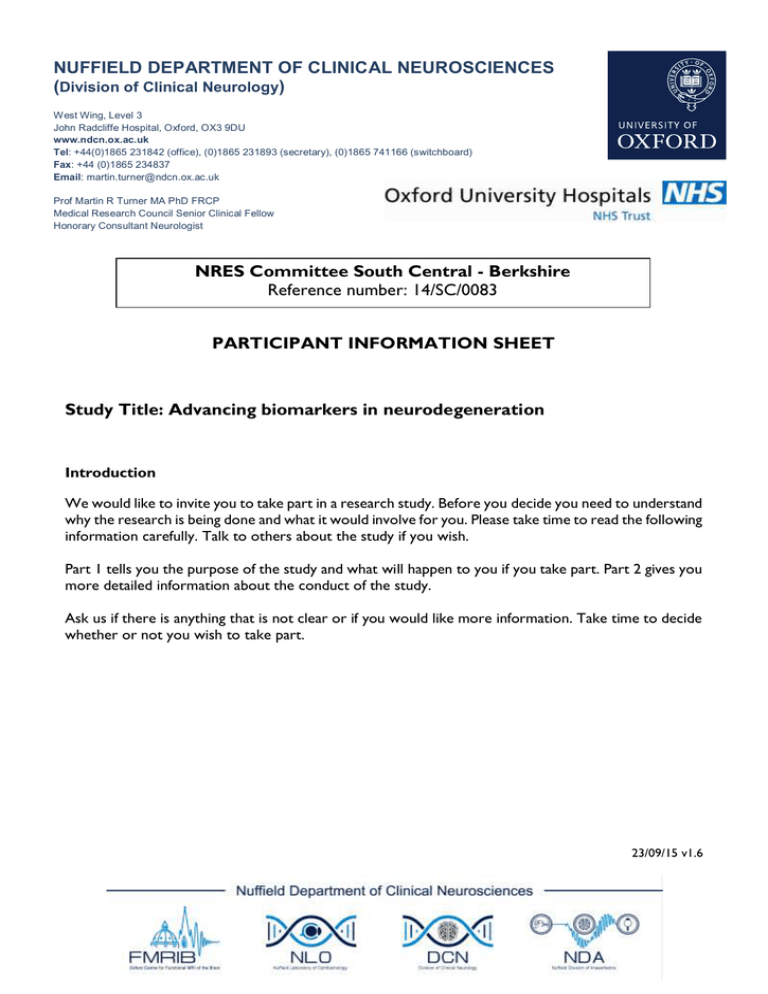
NUFFIELD DEPARTMENT OF CLINICAL NEUROSCIENCES (Division of Clinical Neurology) West Wing, Level 3 John Radcliffe Hospital, Oxford, OX3 9DU www.ndcn.ox.ac.uk Tel: +44(0)1865 231842 (office), (0)1865 231893 (secretary), (0)1865 741166 (switchboard) Fax: +44 (0)1865 234837 Email: martin.turner@ndcn.ox.ac.uk Prof Martin R Turner MA PhD FRCP Medical Research Council Senior Clinical Fellow Honorary Consultant Neurologist NRES Committee South Central - Berkshire Reference number: 14/SC/0083 PARTICIPANT INFORMATION SHEET Study Title: Advancing biomarkers in neurodegeneration Introduction We would like to invite you to take part in a research study. Before you decide you need to understand why the research is being done and what it would involve for you. Please take time to read the following information carefully. Talk to others about the study if you wish. Part 1 tells you the purpose of the study and what will happen to you if you take part. Part 2 gives you more detailed information about the conduct of the study. Ask us if there is anything that is not clear or if you would like more information. Take time to decide whether or not you wish to take part. 23/09/15 v1.6 Part 1 What is the purpose of the study? Motor Neurone Disease (MND, also called amyotrophic lateral sclerosis, ALS) is one of several neurodegenerative diseases affecting the nervous system but scientists believe there may be shared causes. MND causes progressive muscular weakness, and neurologists recognise that there are different forms of MND, and that the way in which the disease spreads is very variable between patients, but it is not clear why that is the case. At present there is no specific test for MND, and the diagnosis currently depends on the recognition of typical features by those doctors used to seeing the condition. This can sometimes cause a delay in diagnosis. Furthermore, there is currently no effective treatment for MND, and it can take many months to establish whether or not new drugs are working due to a lack of markers of disease activity. We would like to discover a test to speed up the diagnosis of MND, to understand how the disease spreads, and to monitor its activity. An understanding of the factors that influence the spread and progression of MND might lead to more targeted treatments, as well as improve the way that future drug trials are monitored, and so that the ineffective drugs can be discounted more quickly. Our objectives require the discovery of ‘biomarkers’ such as changes seen on brain scans (magnetic resonance imaging, MRI, and magnetoencephalography, MEG), or substances identified in the blood or spinal fluid, that are sensitive and specific to MND. Why have I been chosen? This study will look for biomarkers by studying and comparing people in several groups. You will be in one of the following: Someone with MND (up to 100 people, half of who may only be offered limited tests) Someone with a diagnosed condition that looks like, but is not MND (up to 30 people) Someone suspected to have MND and referred for neurological tests (up to 30 people) A healthy person from a family where there is a genetic mutation linked to MND (up to 30 people) A healthy person who is not related to someone with MND or dementia (up to 100 people, half of who may only be offered limited tests) You may have attended a regional Motor Neurone Disorders Clinic and expressed an interest in contributing to our research efforts, or read about our wider research efforts through MND Association information, and made contact through the internet to find out more. Do I have to take part? It is up to you to decide whether or not to take part, and you may wish, or be able to take part in only some of the tests and not others. We will describe the study and go through this information sheet, which we will then give to you. We will then ask you to sign a consent form to show you have agreed to take part. If you decide to take part you are still free to withdraw at any time and without giving a reason. This would not affect the standard of care you receive. 23/09/15 v1.6 What would happen to me if I take part? If you decide to take part then we will arrange a mutually convenient time to meet. Informed written consent would be taken prior to any study procedures. The testing would take place at the John Radcliffe and Warneford hospital sites in Oxford. The full study would involve attending for 1 or 2 days separately (depending on how much of the testing you decide to complete and scheduling constraints). For some of those with MND we hope to repeat the study every 3-6 months for up to a total of 3 visits. For some of those carrying genetic mutations linked to MND, we hope to repeat the study annually for up to 3 visits. You do not necessarily have to undergo all aspects of the study, and we recognise that some aspects e.g. lying flat, may become too difficult for some patients over time. Participation in only some of the tests in the study still provides very valuable information. The full study involves: a physical and cognitive assessment (up to 90 minutes, with breaks) MRI scan (up to 90 minutes, with breaks) MEG scan (up to 2 hours, with breaks) a blood test (<15 minutes) removal of a sample of spinal fluid under local anaesthetic (<1 hour) The MRI scans would be carried out at the Oxford Centre for Functional Magnetic Resonance Imaging of the Brain (FMRIB) and the Oxford Centre for Magnetic Resonance Research (OCMR), and the blood and spinal fluid tests on the Neurosciences Day Investigation ward (Level 2 of the West Wing), which are all at the John Radcliffe Hospital in Oxford. The MEG takes place at the Oxford Centre for Human Brain Activity (OHBA), Warneford Hospital in Oxford. What would I have to do? This research project does not require any lifestyle restrictions (e.g. dietary, drive, drink, taking part in sport). You can continue to take any regular medication, but it would be important for you to let us know what these are, and any new medications you might start during the course of the study. The physical examination will not require you to undress fully, and will be the same as your neurologist has performed before. The cognitive testing involves some reading and writing tasks, and painlessly measuring the speed of your eye movements using a portable camera worn like a hat while you follow dots projected on a wall. The MRI scanner is a tube about 60cm in diameter. We have two MRI scanners which differ in their magnetic field strength and each one provides different information. One scanner is at FMRIB, and the other at OCMR which are buildings next door to each other. Each scan is broken into different parts, each 10-30 minutes each, and in total lasts approximately 60 minutes from the time you enter the tube. MRI involves very powerful magnetic fields so we must ensure that there are no metal objects about your person, or implanted from previous surgery or accidents. After a questionnaire about possible metal implants, we will ask you to remove loose jewellery. We will provide clean pyjama-style clothing to wear, and a safe place to put your own clothes and any valuables. For the scan you would lie on a cushioned bed, which would then be moved into the middle of the tube. We would help you on to the bed if mobility is difficult (including a hoist if needed), and ensure you are comfortable prior to starting. The scan is noisy (like a road drill) but we will provide earplugs, and you would able to speak to the radiographer at all times. There is a ‘panic button’ you can press at any time if you want to stop the scan and be taken out. We would remove you immediately if you felt uncomfortable in any way. We would not need to give you any injections during the scan, and MRI does not involve exposure to any ionizing radiation (e.g. X-rays). During the scan, we will measure your pulse and breathing rate noninvasively – this can improve the scan analysis later. You will mainly be asked to lie as still as possible, breathing normally, sometimes to look at a screen or to squeeze your fist gently. 23/09/15 v1.6 MEG is a silent, non-invasive brain imaging technique that measures the magnetic fields produced by nerve cells. Brain activity is measured by sitting comfortably upright under a helmet which contains sensitive detectors. MEG measurements can be affected by metal in the shielded room so you will be asked to remove any jewellery items, removable dental braces and any clothing that has metal parts or a metallic finish. If you are wearing glasses with metal parts, you will be given special non-metallic glasses to wear. Before you enter the scanner we will attach some slightly sticky electrode pads to your wrists to measure your heartbeat and around your eyes to measure eye movements. We also place small pads near the forehead and above the ears to record the position of your head in the scanner. During the measurement, it is possible to ask to stop at any time. The recording involves pressing a button on a box or squeezing your hand when asked, and other tests of memory and thinking, during which we will painlessly monitor your brain activity. The blood test is taken using a sterile needle into a vein in your arm, with you sitting or lying as preferred, and removes 25ml of blood (5 small standard bottles). This is not an amount large enough to cause you any adverse symptoms. The spinal fluid sample is removed by a lumbar puncture (LP). This is a very routine procedure in our hospital and is only ever done by highly trained staff who have done many such procedures. A narrow sterile needle is introduced into the space at the base of your spine under local anaesthetic, to drain up to 10ml of spinal fluid (less than 10% of the total amount, and which is replaced by the body within a few hours). This is done whilst you are sitting (or lying) comfortably on a hospital bed. We suggest that you rest lying flat for 30 minutes after the procedure. You may drive afterwards. What are the potential side effects of taking part? If you know you are easily claustrophobic then you might find the enclosed space of the MRI scanner unpleasant. If this is the case then you should not take part in this study. MRI is very noisy but you would be given earplugs to wear. The scanner produces a strong magnetic field that can affect heart pacemakers and some other metal objects in the body (such as clips used in brain surgery or fragments of metal from old injuries, especially around the eye). We cannot do a scan if you have a pacemaker or certain metal objects in the body. We will go through a check-list with you before scanning to ensure this is not the case. MRI is not known to be harmful to the unborn child, but to be safe we avoid scanning pregnant women unnecessarily. MEG is not like MRI and does not generate any noise or magnetic fields that might cause metallic objects to move or heat up. There are no known risks associated with MEG. The blood test is taken from a vein in your arm and is briefly painful for some (a few seconds). There may be minor temporary bruising at the site of removal. There is always a theoretical risk of introducing infection into the skin, blood or spinal fluid with any invasive procedure, but in practice the use of sterile single-use equipment by highly-trained staff makes this risk extremely remote. Any infection would be treated promptly with antibiotics. The spinal fluid removal procedure (or LP) is generally a very safe and trouble-free procedure. Although many people understandably worry beforehand that it might be very uncomfortable, this is not our usual experience, and highly-trained doctors perform this procedure routinely without any complications. LP can be briefly painful when the local anaesthetic is applied under the skin of the lower back, and occasionally as the needle is passed into the space between the bones it can cause a momentary feeling like an electric shock in your legs. In practice, when carried out by experienced staff (as it would be), there is rarely any significant discomfort for patients. The removal of spinal fluid can however sometimes result in a temporary headache the day after the procedure. The headaches occur because of temporary low spinal fluid pressure due to leaking fluid from the needle hole, and is recognisable because it is better lying down. This complication affects 523/09/15 v1.6 10% of patients to a mild extent. It is more common in those under 40 years of age. In rare cases the headache is persistent or severe enough to keep a person in bed for several days, and extremely rarely requires a second procedure to try to seal the hole preventing further fluid leak. In practice LPs are carried out on a daily basis at the John Radcliffe hospital without complications, and all the necessary facilities and staff are available to deal with any unexpected problems. Expenses and payments For those visits outside the normal routine clinic attendance, all of your travel expenses will be fully reimbursed, using standard business mileage costs for car travel and any parking costs. We will also reimburse you £50 per study visit (which may involve one or two days) for your time and inconvenience. The costs are refunded directly into your bank account within one month of each visit via our Finance Department. What if you found an unexpected abnormality? Research is still a long way from finding a simple “test for MND”. In theory however, our work might identify markers suggesting early signs of MND in those without symptoms, or a more adverse prognosis in some of those with MND. However, such findings would be based on the results from groups of participants, and could not be reliably interpreted for an individual. For this reason, we do not intend to discuss individual results with participants, but we will keep all participants informed about overall group-level findings, and inform the wider international scientific community. Occasionally we do find something unexpected on the MRI scan. If so, we would discuss it with you if Prof Martin Turner and a consultant neuroradiologist felt there were clear implications for your future health, and would then ask your permission to contact your GP to arrange any further tests as needed. What are the possible benefits of taking part? We hope the information from this study will contribute to a greater understanding of the causes of MND and why it varies among patients. We hope it will allow us to both design better treatments, and to test them more quickly. This completes Part 1. If the information in Part 1 has interested you and you are considering participation, please read the additional information in Part 2 before making any decision. 23/09/15 v1.6 Part 2 What happens if I don’t want to carry on with the study? You can withdraw from the study at any time, without giving a reason. It will not affect your future care in any way. Information we have collected may still be useful in future research, and if applicable then we would like to maintain contact with your local neurologist to follow up on your progress. Any stored images or samples identified as yours can be destroyed if you wish. What if there is a problem? If you wish to complain about any aspect of the way in which you have been approached or treated during the course of this study, you should contact the study organiser (01865 231893 secretary for Prof Martin Turner) or you may contact the University of Oxford Clinical Trials and Research Governance (CTRG) office on 01865 572224 or the head of CTRG, email ctrg@admin.ox.ac.uk The University of Oxford, as Sponsor, has appropriate insurance in place in the unlikely event that you suffer any harm as a direct consequence of your participation in this trial. Will my taking part in this study be kept confidential? All personal information collected about you would be kept strictly confidential. Your samples and results would be stored using a code instead of your name and would have your address removed. Only Prof Martin Turner, as the study organiser, will have access to this code. In this way it would not be possible for anyone else to identify the results as yours. All results will be stored in a passwordprotected form. All samples will be stored in secure premises. Responsible members of the University of Oxford or the host NHS Trust may be given access to data for monitoring and/or audit of the study to ensure we are complying with regulations. Anonymised data collected during the course of the study may be passed on to other organisations which may include commercial organisations. This might also include anonymous quotations from participants about their experience of taking part in this study. Will my Doctor know that I will be taking part? Your GP and, where applicable, the neurologist looking after you would be informed about your participation in the study. What will happen to any scans or samples I give? The data and samples collected may be analysed by Prof Martin Turner’s scientific collaborators as part of this study. These may include University departments or MND research groups in the European Community, USA, Canada, and Australia, and may include research into other neurodegenerative conditions as well as MND e.g. Parkinson’s and Alzheimer’s diseases. They would be stored securely and anonymously by such groups, and only Prof Martin Turner would have access to the code to establish the identity of the samples. We would like to use any remaining anonymised samples and study data for use in future research, but you can ask us to destroy your samples at any time. What would happen to the results of the research study? We hope that the results of this study will be suitable for scientific publication in biomedical journals, and for communication to patients via the MND Association. If you wish we would provide you with a summary of our final overall results. 23/09/15 v1.6 Who is organising and funding the research? The research has been organised by Prof Martin Turner (Honorary Consultant Neurologist), based in the Oxford University Department of Clinical Neurosciences. The financial support for the study has come from the Medical Research Council UK. Who has reviewed the study? The National Research Ethics Service (NRES) Committee South Central - Berkshire has reviewed the study. An external review process run by the Medical Research Council reviewed the scientific basis of the study. Contact for further information Professor Martin Turner Consultant Neurologist West Wing Level 3 John Radcliffe Hospital Oxford OX3 9DU 01865 231893 martin.turner@ndcn.ox.ac.uk 23/09/15 v1.6
